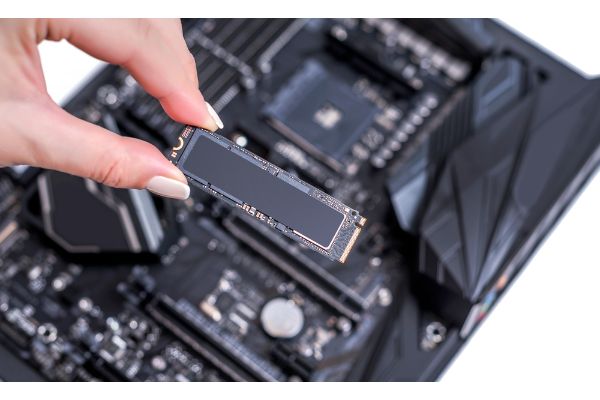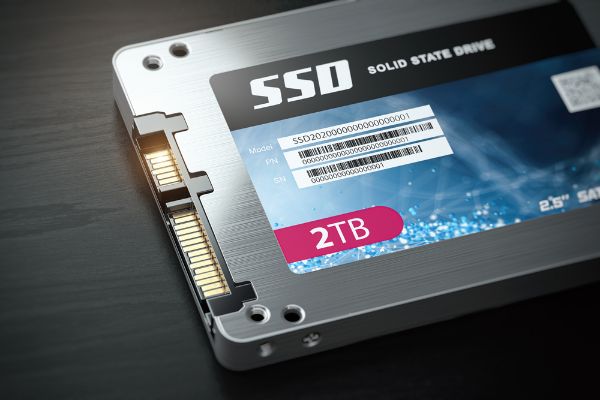Disclaimer: This post may contain affiliate links, meaning we get a small commission if you make a purchase through our links, at no cost to you. For more information, please visit our Disclaimer Page.
SSD stands for a solid-state drive, which is a device inside your computer that stores important data. Not only does it give you storage space, but it also allows you to access your interface and make changes on your computer. Find out more about these drives and what they do along with whether the size affects your overall performance.
Table of Contents
Why Are SSD So Small?
You might notice that the SSD you use today is much smaller than those you used in the past. Both computers that run iOS and Windows now come with an SSD. The SSD is so small because the size helps it run quietly as you do other things.
If you ever had a computer with a small hard drive before, you know that it can make a lot of noise whether you’re shopping online or playing a game.
The small size of an SSD makes it run quietly, but this also makes it more reliable. You don’t need to worry about your SSD dying in the middle of a game or while you’re working on a document.
Box vs. Actual Size
One problem you might encounter is that you order an SSD with a certain amount of space and find that it doesn’t have as much free space when you install it. The reason for the two different figures is that the SSD subtracts space based on your operating system.
You may notice that you have less free space because your computer relies on that drive when you play a game or use a program. Different types of operating systems can also use different amounts of your SSD.
Does SSD Size Affect Performance?
When you decide to buy a new SSD and replace your old one, you’ll want to know what size to get and whether size affects the performance. The answer to this question is yes but also no. The SSD contains a certain number of empty blocks that fill with data every time you turn on or use your computer.
When you have a larger drive that has more available space, the SSD runs faster. It can quickly identify empty blocks and fill them with content. If you have a smaller SSD, you’ll fill those blocks faster. The drive will run slower because it needs to find blocks it can use.
You should keep in mind though that size doesn’t always affect performance. Let’s say that you have a 1TB SSD that is almost completely full. The lack of empty blocks will force your computer to run slowly when you try to save data or use apps.
If you compare that SSD to a 500GB model that is only 50% full, you’ll find that the smaller one runs much faster. You usually want to keep a minimum of 70% of the SSD free to boost your drive’s performance.
SSDs and Slow Speeds
There is a chance that your computer might slow down due to problems with your SSD. This usually happens because the drive is nearing capacity and does not have enough empty blocks. Your SSD will spend more time looking for free blocks to add new data. When you clear some of those blocks, you can help the drive run faster. This does not relate to the size of the SSD but rather the amount of available space. You’ll experience the same problem when you have a large or small drive that lacks empty blocks.
What Else Affects Your Speed
There are tons of factors that affect your computer and its speed. If you ever bought a new computer, you know that it ran at lightning-fast speeds right out of the box and later slowed down. The amount of space on your hard drive is a big factor that affects your speed.
When you have less available space on your hard drive, you can expect your computer to run slowly. Malware hidden in your system can also affect your speed.
You might pick up malware when you download a game or you play videos online. Malware can include both adware and spyware. Other factors that affect your speed and performance include:
- The type of graphic card you have.
- How many temporary files are on your computer.
- Your amount of available RAM.
- The number of cores or processors.
- Your clock speed.
Is it Better to Have One Large SSD or Two Smaller Ones?
There are pros and cons to both using one large SSD or two smaller ones. When you buy a new SSD, you will find that you may pay the same amount whether you buy one or two.
If you buy a 1TB SSD, you might see it priced at around $200 for a quality one. That same SSD in a 500GB size may cost around $100, but you’ll need two of them.
Using one large SSD allows you to get a drive that helps your system run faster. It also comes in handy when you play some of the advanced games that require a lot of space and a fast processing speed. The downside is that if the SSD fails, you need to completely replace it.
Buying two smaller ones is best if you have enough space in your PC for two drives. You get more space, which can help your computer run faster and also get more storage space to store more things on the drive.
In some cases, you may find that you can buy two small drives for less than it would cost to buy a large one, especially if you don’t need a lot of space.
On the other hand, you risk one or both drives dying because your PC doesn’t have enough ventilation. When this happens, you may lose all of your stored data. If you’re interested, we also have similar article to this topic, but it’s about hard drives. Check it out here.
Is it Worth Getting a Big SSD?
It is worth getting a big SSD if you are a gamer who likes playing different games. Old SSDs had a limited amount of memory. Once you filled all of the empty blocks, the drive had a hard time rewriting those blocks.
This led to players losing their progress and needing to uninstall some of their games. Modern drives are more efficient and effective. They can easily store your progress in empty blocks and rewrite them as needed.
When you buy a large one, you’ll have more than enough space to play your games. A large SSD also comes in handy if you have a PC that runs slowly when you play.
A large SSD is also useful if you have a computer that loads slowly. Do you boot your computer and find that you need to wait five minutes or longer until you reach your desktop?
This often occurs because your PC doesn’t have enough memory and needs to find enough blocks to run your OS. With a new SSD, you may find that your PC starts faster and reaches your desktop in two minutes or less. You can get the same benefits when you install two small drives though, which is why some think it’s not worth the money to upgrade to a large SSD.
Are Large SSDs Really Necessary?
In general, a large SSD is not necessary. Your SSD examines all of the available blocks and finds where to add new data. When you save a file that already exists, the SSD simply copies that information and moves it to a new block. The former block then becomes available for any future data that you need to save.
When you play games, your SSD will save and copy hundreds of files in seconds as you move through each level. The SSD writes and rewrites blocks faster than your computer can on its own.
Though you don’t necessarily need a large SSD, there are some things to consider when buying a new drive, including:
1. Computer slots
Your PC may have slots that only allow you to install and use M.2 drives. Other computers have slots that are compatible with 2.5-inch drives. You need to make sure you buy an SSD that is compatible with your PC.
2. Price
It wasn’t that long ago that the cost of a 1TB SSD was $300-500 or more. As technology changed though, the price of those drives dropped. Depending on when you shop, you might find some of these larger drives priced at as little as $100.
3. Capacity
SSDs come in a range of sizes that are perfect for gamers who play multiple action-packed games and people who need to do work on their computers. A 250-500GB SSD is usually best for most people. It gives you enough space to edit documents and store photos on your PC.
Don’t forget about new forms of technology like SATA either. SATA drives are so common that you can pick one up in almost any electronics store. They are also cheaper than other types, which can save you money when building a PC. The biggest problem with SATA is that it runs slower than you might like.
SSD and Performance
Your SSD is an important part of your computer because it stores data as you use all of your favorite programs and apps. Though some think that you need a big SSD to play games and use large apps, the size usually doesn’t affect your performance. You can often get the same benefits when you install one or two smaller SSDs.


